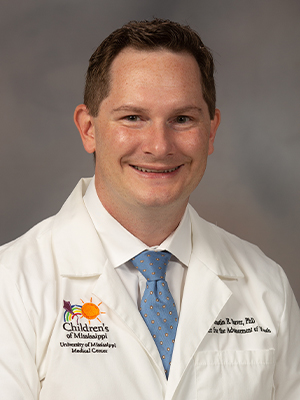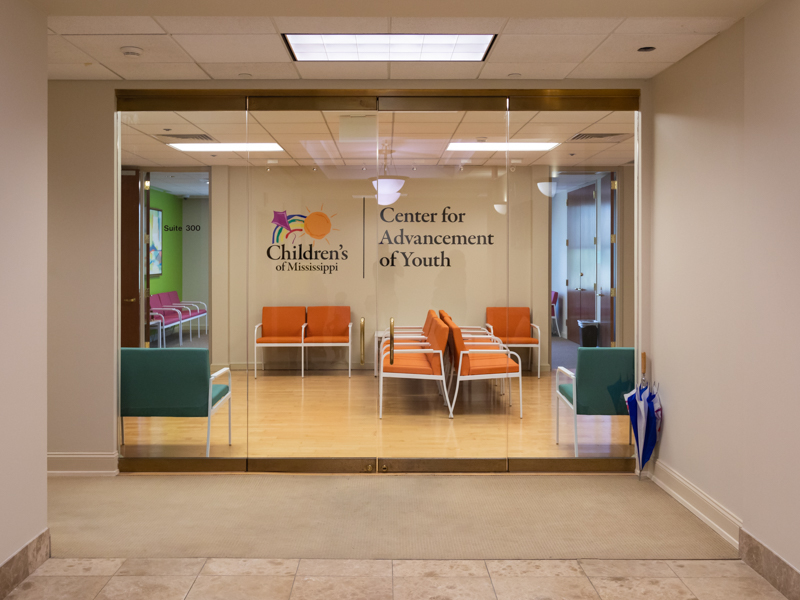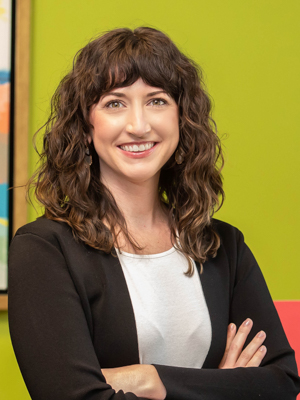Pediatric mental health care need rises, UMMC researcher finds

The demand for pediatric mental health care services increased during the COVID-19 pandemic, a study including University of Mississippi Medical Center experts found.
The study, “Trends in Mental Health Concerns Reported to Two Pediatric Mental Health Care Access Programs During the COVID-19 Pandemic,” was published in the journal Psychiatric Services and was written by Dr. Dustin Sarver, associate professor at the University of Mississippi Medical Center and a psychologist and researcher with Children’s of Mississippi’s Center for Advancement of Youth, project managers Terrence Hibbert and Carson Allen of CAY, and Dr. Amie Bettencourt of Johns Hopkins School of Medicine and Kelly Coble, licensed certified social worker-clinical, of the University of Maryland School of Medicine.
The data from the study were also presented in October at the virtual annual meeting of the American Academy of Child and Adolescent Psychiatry.
Sarver is clinical director of CHAMP, or Child Access to Mental Health and Psychiatry, a five-year $2.3 million federal cooperative agreement through the Health Resources Services Administration that seeks to increase Mississippi children’s access to mental health care.

“The call volume in Mississippi from primary care providers regarding concerns about their patients’ mental health reflected the same thing that was happening in Maryland in a program similar to CHAMP there,” Sarver said. “The volume was above average starting right at the beginning of the pandemic, but once the pandemic began there was a substantial well above average increase in calls to our program. This probably reflects both that children and youth were experiencing more mental health problems and that providers were more aware of them too.”
The study compared call volume of CHAMP as well as a similar program in Maryland. Increases were observed in calls regarding patients with multiple diagnoses – from 20 to 37 percent in Maryland and up to 11 percent in Mississippi. The study also showed that calls mostly increased regarding concerns for mood or anxiety symptoms.
This comes as the American Academy of Pediatrics, the American Academy of Child and Adolescent Psychiatry and the Children’s Hospital association declared a national state of emergency over child and adolescent mental health.
Allen sparked the idea for the study after CHAMP had collaborated with their colleagues in Maryland.
“It came from curiosity about how COVID-19 was affecting other states,” Allen said. “I’m happy they were open to exploring this issue with us.”
According to the UMMC-Johns Hopkins-University of Maryland study, nearly half of children and adolescents with a psychiatric diagnosis were not receiving treatment prior to the pandemic, a figure that is even higher in Mississippi. Even though the number of child psychiatrists is growing, it’s estimated that 70 percent of counties across the U.S. don’t have access to a child psychiatrist.

In Mississippi, CHAMP is working to change that. CHAMP works as a hotline connecting primary care providers to child mental health experts at UMMC and is expanding to provide continuing education in mental health to primary care providers to increase patients’ access to care.
“Our goal is to look for resources for patients and help them in their medical home so there’s no need for them to come to Jackson,” Sarver said.
Dr. Braveen Ragunanthan, a pediatrician at Delta Health Center in Mound Bayou, said CHAMP is helping doctors like him throughout the state.
“I work in the rural Mississippi Delta, and I am extremely grateful for the excellent organization and support of the CHAMP providers and staff in helping me with my consult questions as I serve my patients with behavioral health concerns.”
CHAMP and Mississippi Thrive!, a partnership with UMMC, Children’s of Mississippi and Mississippi State University’s Social Science Research Center, are the focus of an evaluation of ECHO programs to improve the developmental, behavioral and mental health of Mississippians 21 and younger.

“The goal of our CAY-ECHO program is to increase behavioral health and psychiatric care availability in rural areas by sharing our knowledge with providers in the region,” said Dr. Courtney Walker, assistant professor of child development.
Project ECHO, or Extension for Community Healthcare Outcomes, supports primary care providers in rural areas of the state that have a shortage of specialists. It helps patients who must travel long distances for specialty care or cannot access it.
“We have about 25 percent of the pediatric primary care providers in the state registered with CHAMP,” Sarver said. “We have over 270 primary care providers now and aim to add another 100 in 2022. We’re in 66 percent of the state’s counties, and we hope to eventually have a one in each county in Mississippi so we can increase access to care throughout the state.”
To sign up, physicians may visit umc.edu/champ or call (601) 984-2080.


